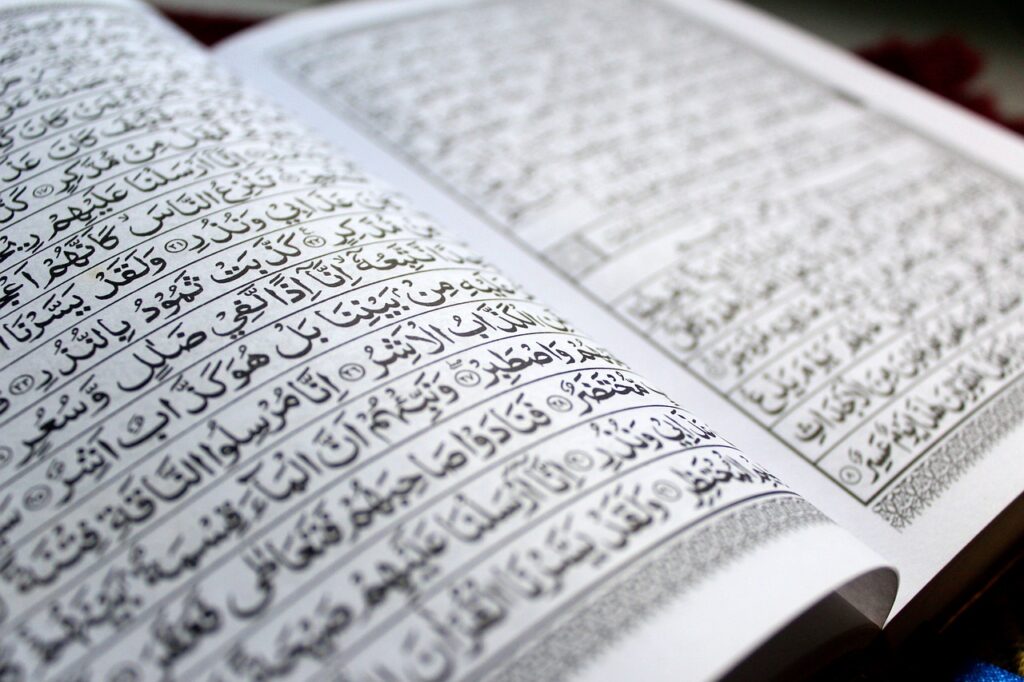Table of contents
The Quran holds immense significance in the lives of millions worldwide. As the central religious text of Islam, it serves as a guiding light for Muslims. It provides spiritual nourishment, moral guidance, and a comprehensive framework for leading a meaningful and purposeful life. But why is the Quran important? Let’s explore the profound impact of the Quran on individuals and communities, delving into its divine origins, timeless wisdom, and transformative power. Join us on this enlightening journey as we unravel the significance of the Quran.
Historical Significance of the Quran
The Quran holds immense historical significance. It is not only a religious text but also a profound testament to the culture of the time it was revealed. Let’s delve into two key aspects that highlight this historical importance: the revelation of the Quran and its preservation.

The Revelation of the Quran
The Quran was revealed to Prophet Muhammad (pbuh) over a span of approximately 23 years, starting in 610 CE. Muslims believe that the Quran was directly revealed to Prophet Muhammad (pbuh) by Allah (God) through the angel Gabriel. This divine revelation is as a pivotal event in Islamic history and holds great significance for Muslims.
The revelation of the Quran took place during a time when the Arabian Peninsula was steeped in ignorance, superstition, and societal injustices. The Quran brought a message of monotheism, social justice, and ethical conduct. It urged people to abandon idolatry and embrace a life of righteousness and compassion.
Preservation of the Quran
The preservation of the Quran is an extraordinary feat that sets it apart from other ancient texts. From the very beginning, great care was taken to ensure the accurate transmission and preservation of the Quran’s words. The oral tradition played a crucial role in preserving the Quran, with many early Muslims memorizing the entire text.
To safeguard against any errors or inconsistencies, the Quran was also written down on various materials such as palm leaves, parchment, and bone fragments. This written form of the Quran served as a backup to the oral transmission, minimizing the risk of any potential alterations.
During the reign of Caliph Uthman ibn Affan, a standardized written version of the Quran was compiled and distributed across the Islamic empire to ensure uniformity and accuracy. This meticulous preservation, both orally and in written form, has ensured that the Quran remains unchanged from its original form for over 1400.
Religious Importance of the Quran
The Quran holds immense religious significance for Muslims around the world. It serves as a comprehensive guide for their faith and provides profound spiritual enlightenment. Let’s explore the two main aspects of the religious importance of the Quran:
Guidance for Muslims
The Quran is the ultimate source of guidance for Muslims. It is the literal word of God, revealed to the Prophet Muhammad through the angel Gabriel. Within its sacred texts, Muslims find instructions on how to live a righteous and fulfilling life.
- Moral and Ethical Guidelines: The Quran provides Muslims with a comprehensive framework of moral and ethical principles. It outlines the virtues they should cultivate, such as compassion, honesty, kindness, and justice. These guidelines serve as a moral compass for Muslims, shaping their behavior and interactions with others.
- Legal and Juridical System: The Quran also provides Muslims with a legal and juridical system known as Sharia. It offers guidance on various aspects of life, including family law, criminal justice, commerce, and social welfare. Muslims turn to the Quran to seek clarity on matters of personal conduct, societal norms, and legal rulings.
Source of Spiritual Enlightenment
Beyond providing practical guidance, the Quran is a profound source of spiritual enlightenment for Muslims. It holds immense beauty and power, inspiring believers to connect with their faith on a deeper level.
- Divine Revelation: Muslims view the Quran as a direct communication from God, making it a deeply spiritual text. Its verses, known as Ayat, convey divine wisdom, solace, and insights into the nature of the universe. Muslims engage with the Quran to establish a personal connection with the divine and seek spiritual enlightenment.
- Linguistic Miracle: The Quran is revered for its eloquence and linguistic excellence. It is written in classical Arabic, known for its richness and poetic beauty. Muslims find solace in reciting and understanding the Quran, appreciating its linguistic marvels and the profound messages it conveys.
In summary, the Quran holds immense religious importance for Muslims. It serves as a guiding light, offering instructions on righteous living and a comprehensive legal system. Moreover, it is a powerful source of spiritual enlightenment, allowing Muslims to connect with their faith and find solace in its divine revelations.
Literary and Linguistic Excellence of the Quran
The Quran, the holy book of Islam, is celebrated for its unparalleled literary and linguistic excellence. Its unique style and eloquence captivate readers, while its linguistic miracles continue to astonish scholars. Let’s explore these aspects in more detail:

Unique Style and Eloquence
The Quran showcases a distinctive style and remarkable eloquence that sets it apart from any other text. Its rhythmic prose, known as the saj’, flows effortlessly, creating a harmonious and melodious composition that resonates with its readers.
The choice of words, sentence structure, and composition in the Quran are masterfully crafted to convey profound meanings and evoke powerful emotions. Every word is carefully placed, which creates a deep impact on the reader’s heart and mind.
Linguistic Miracles
One of the most intriguing aspects of the Quran is its linguistic miracles. These miracles encompass various elements, including eloquence, precision, and the use of rhetorical devices, which go beyond human capability.
The Quran’s linguistic miracles are witnessed in its ability to present complex concepts with utmost clarity and simplicity. It expresses profound concepts in concise and eloquent ways, allowing readers to grasp deep truths effortlessly.
Moreover, the Quran employs rhetorical devices such as repetition, parallelism, and vivid imagery to drive its message home. It engages the reader’s intellect and emotions, leaving an indelible imprint on their consciousness.
The linguistic miracles of the Quran are a testament to its divine origins. They defy the limitations of human language, establishing the Quran as a remarkable literary and linguistic masterpiece.
In conclusion, the literary and linguistic excellence of the Quran is a testament to its divine origin. Its unique style and eloquence capture the hearts of readers, while its linguistic miracles continue to fascinate scholars. The Quran stands as a timeless masterpiece that transcends the boundaries of language and culture.
Moral and Ethical Guidance in the Quran
The Quran, the sacred text of Islam, holds immense significance for Muslims around the world. Apart from serving as a source of spiritual guidance and revelation, the Quran also provides invaluable moral and ethical guidance. It offers a comprehensive framework for personal conduct and serves as a beacon of moral values and ethical principles. In this section, we will explore the universal moral values emphasized in the Quran, as well as the ethical principles it outlines for personal conduct.
Universal Moral Values
The Quran lays a strong emphasis on universal moral values that are applicable to all individuals, regardless of their background. These moral values serve as a foundation for creating a just and harmonious society. Some of the prominent universal moral values highlighted in the Quran include:
- Justice: The Quran urges individuals to be just in their dealings with others, treating everyone with fairness and equity.
- Compassion: Islam places a high value on compassion and kindness towards others, fostering a sense of empathy and care for all living beings.
- Truthfulness: The Quran emphasizes the importance of honesty and integrity, promoting a society built on trust and sincerity.
- Humility: Islam encourages believers to be humble and modest, acknowledging the inherent equality of all individuals before God.
- Forgiveness: The Quran promotes the virtue of forgiveness, inspiring individuals to let go of grudges and embrace reconciliation.
Ethical Principles for Personal Conduct
In addition to universal moral values, the Quran provides ethical principles to guide individuals in their personal conduct. These principles serve as a practical framework for Muslims to navigate their daily lives, making conscious choices aligned with their faith. Some of the ethical principles highlighted in the Quran include:
- Integrity: Islam emphasizes the importance of maintaining personal integrity and upholding moral standards, even in the face of challenges and temptation.
- Responsibility: The Quran encourages believers to take responsibility for their actions and decisions, recognizing the ripple effect they can have on individuals and society as a whole.
- Self-discipline: Islam promotes self-discipline as a means to resist temptations and make choices that align with one’s values and principles.
- Accountability: The Quran emphasizes the concept of individual accountability, reminding believers that they will be answerable for their actions in the Hereafter.
- Balance: Islam encourages believers to maintain a balanced approach to life, avoiding extremes and finding harmony in all aspects of their existence.
By adhering to these moral values and ethical principles outlined in the Quran, Muslims strive to lead a life of righteousness and virtue. They seek to foster a society based on justice, compassion, and mutual respect, promoting a harmonious coexistence among individuals of diverse backgrounds and beliefs.
Remember, the Quran’s moral and ethical guidance is not exclusive to Muslims alone. Its timeless teachings can resonate with individuals from all walks of life, serving as a source of inspiration and guidance in their quest for a meaningful and purposeful existence.
Quran as a Source of Legal Jurisprudence
The Quran, considered the holy book of Islam, holds great significance for Muslims around the world. Not only is it a spiritual guide, but it also serves as a source of legal jurisprudence. In this section, we will explore two key aspects: the role of Hadith and the application of Quranic principles in legal systems.
Hadith: Expanding on Quranic Teachings
One crucial element of Islamic law is the Hadith, which refers to the recorded sayings, and actions of the Prophet Muhammad (pbuh). The Hadith serves as an essential supplement to the Quran, providing additional insights and context to its teachings. It helps in understanding the practical application of the divine principles outlined in the Quran.
Scholars meticulously scrutinize and authenticate the Hadith to ensure their reliability and alignment with Quranic teachings. From this vast collection, legal scholars extract guidance on matters not explicitly mentioned in the Quran, thus expanding the scope of legal jurisprudence.
Application of Quranic Principles in Legal Systems
The Quranic principles form the foundation of Islamic law, known as Sharia. In many Muslim-majority countries, Sharia plays a prominent role in their legal systems. While the specific application of Islamic law varies across different regions, the objective remains the same – to uphold justice, fairness, and the overall well-being of society.
The Quran provides a framework for addressing various legal matters, including family law, criminal law, and commercial law. For instance, it sets guidelines for marriage, divorce, inheritance, and financial transactions. Islamic legal systems draw upon these Quranic principles to create laws that align with the values and teachings of Islam.
In Islamic jurisprudence, judicial decisions are guided by the interpretation and application of the Quranic principles. Scholars and jurists study the Quran to derive legal rulings that are consistent with its spirit and intent. They analyze the text and draw analogies to apply Quranic teachings to contemporary legal challenges.
By incorporating Quranic principles into legal systems, Muslim societies aim to establish a just and ethical framework that aligns with their religious beliefs. The Quran’s emphasis on justice, equality, compassion, and mercy provides a moral compass for legal rulings, ensuring that they reflect the core values of Islam.
In conclusion, the Quran serves as a vital source of legal jurisprudence in the Islamic world. The Hadith complements the Quran’s teachings by providing practical insights, while legal systems draw upon Quranic principles to create laws that promote justice and societal well-being. By understanding the role of the Quran in legal matters, we gain a deeper appreciation for its significance in shaping the legal landscape of Muslim-majority countries.
Societal Impact of the Quran
The Quran is a religious text that holds immense importance and influence for Muslims around the world. Beyond its spiritual significance, the Quran has also had a profound societal impact, shaping the development of Islamic civilization and fostering principles of social justice. Let’s explore the various aspects of the Quran’s societal influence.
Influence on Islamic Civilization
The Quran played a pivotal role in shaping Islamic civilization, which flourished during the Golden Age of Islam. Muslims regarded the Quran as a source of guidance in all aspects of life, including governance, education, science, and art. Its teachings served as a unifying force, fostering a sense of identity and shared values among diverse Muslim communities.
Throughout history, the Quran has inspired Muslims to seek knowledge and pursue intellectual pursuits. The Quranic emphasis on education led to the establishment of numerous educational institutions, such as madrasas and libraries, which became centers of learning and knowledge dissemination. This intellectual tradition laid the foundation for scientific breakthroughs, advancements in mathematics, medicine, and architecture, and contributed to the overall progress of Islamic civilization.
Quranic Teachings and Social Justice
One of the fundamental principles advocated by the Quran is the pursuit of social justice. The Quran teaches Muslims to uphold equality, fairness, and compassion in all aspects of life. It emphasizes the importance of charity, sharing wealth with those in need, and caring for the less fortunate members of society.
The Quranic teachings on social justice have influenced Muslim societies to establish systems that aim to alleviate poverty and address social inequalities. Islamic charitable institutions such as waqfs (endowments) and zakat (mandatory alms-giving) play a crucial role in providing support and resources to the disadvantaged, ensuring their well-being, and promoting a more equitable society.
Furthermore, the Quran emphasizes the importance of treating all individuals with dignity and respect, regardless of their social status, ethnicity, or gender. It rejects discrimination and calls for justice and fairness in all societal interactions. These principles have had lasting effects on Muslim societies, shaping their legal systems, social norms, and attitudes toward inclusivity and human rights.
Conclusion
In conclusion, the Quran holds immense significance for Muslims around the world. It is the holy book of Islam, and the word of God as revealed to the Prophet Muhammad. The Quran serves as a guide for Muslims in matters of faith, morality, and daily life. It provides a comprehensive set of principles and teachings that shape the beliefs and actions of millions of individuals. The Quran’s importance lies in its role as a source of spiritual guidance, ethical values, and a source of comfort for believers. It is a book that is studied, recited, and revered by Muslims as a means of strengthening their relationship with God and living a righteous life. Its teachings resonate with Muslims, offering them solace, direction, and inspiration in all aspects of life. Understanding the significance of the Quran is crucial in appreciating the beliefs and practices of the Islamic faith.
If you are interested in teaching Quran online or want to learn Quran online, Send us an email to join our amazing team on our contact form.
